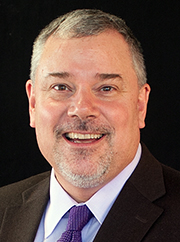Professional Credit: ‘The New Deal’ Approach to Healthcare Collections is Data-Driven and Consumer-Focused


In this business profile, Professional Credit’s President Scott Purcell and Chief Marketing Officer Jeff Johnson discuss the value of having a comprehensive and responsive collections partner..
Tell us a little bit about your organization.
Professional Credit is a third-party collection agency committed to providing healthcare clients with the greatest return on their receivables, and at the same time, treating their patients with the utmost respect. We maintain the highest degree of professionalism while integrating innovative, scientifically based engagement methods to maximize efficiency and recovery. Our organization is part of the Hawes Group, which includes a complementary set of entities primarily focused on health care but also involved in other sectors, including government, utilities, and financial services. Combined, these organizations provide an end-to-end self-pay solution with first- and third-party collection services, patient financing, and technology to enable effective patient engagement.
What are some of the biggest challenges you see affecting healthcare organizations?
Right now, the biggest unknown is what’s going to happen with the Affordable Care Act. There are multiple national initiatives under discussion, and no one is completely sure what the future holds. We do know, however, that hospitals’ margins are continuing to shrink as they receive less reimbursement from insurers. At the same time, patients are taking on greater responsibility for payments, meaning that more accounts potentially could end up in collections. As such, hospitals and health systems need a partner that is able to efficiently and reliably capture payments while appreciating the sensitivity involved with this type of collection.
Forward-thinking healthcare organizations are also working to attract and retain patients, and having the right collections partner can be important to realizing this goal. Even if a patient is not able to pay for healthcare services today, you don’t want to alienate the person during collections. When he or she has another healthcare episode six or seven years down the road, you still want the individual to think favorably of the hospital.
How does your service offering address these needs?
Professional Credit has created an approach called “The New Deal” that allows us to serve as a trusted business partner for healthcare organizations. This includes leveraging technology and science to facilitate more compassionate, timely, and effective conversations to resolve a patient’s balance. We have a decision science team led by a PhD data scientist that looks at data trends to make sure that we are contacting specific consumers or groups of consumers at the right times and in the right ways. The result is better recovery and a more pleasant experience for the patient—and, of course, a positive outcome for our clients.
Our approach also incorporates data analytics to determine an individual’s initial propensity to pay, which lets us focus attention on realistic targets. We monitor individuals over time, recognizing when positive changes occur in their lives, such as a new job or a big raise, which could influence their propensity to pay. Once we identify a change, we can reach back out to an individual to bring resolution to his or her unpaid debt.
Ultimately, our technology-enabled, customer-focused New Deal drives robust recovery rates that track ahead of the Association of Credit and Collection Professionals (ACA) International average. We also sustain top levels of compliance, ensure the utmost data security, and reduce potential risks or unnecessary costs that could negatively affect the healthcare organization.
What are some key considerations for healthcare leaders when choosing this type of service?
First and foremost, you should be philosophically aligned with the vendor in terms of your values, mission, and vision. If your world views are not in sync, then it will be difficult to maintain a positive, long-term relationship.
Another thing to consider is whether the agency is peer-reviewed by HFMA. A lot of work goes into HFMA’s Peer Review process, and you can be confident if an agency has met the specific criteria developed under their rigorous vetting process. Vendors should also have a Professional Practice Management System (PPMS®) certification offered by ACA International. This comprehensive program includes a set of compliance requirements and best practice rules. It closely mirrors the ISO 9000 quality standard, and only a small number of agencies in the world have this designation.
Be sure to check a vendor’s technology and regulatory compliance credentials. A hospital has enough on its plate, and if it can’t rely on its collection agency to provide good data security and strong regulatory compliance, then that increases the organization’s risk.
Transparency is also essential. Organizations should seek a partner that provides a clear window into operations and performance. Our clients can go online 24/7/365 to see what’s going on with their accounts. We also record all our calls for auditing purposes. Although other agencies might monitor a few calls each month, we review every single one, auditing them for key words and tone. Reports are sent to supervisors and managers so that leadership is acutely aware of what’s going on during phone calls. We also make it easy for our clients to have access to these calls.
As healthcare organizations implement use of your service in their day-to-day operations, what advice would you offer so they can best set themselves up for success?
The more data healthcare organizations provide to their collection agency, the better. In today’s age, we’re all driven by data, and it is vital to have the most information possible so we can provide the best service. This might include date of birth and Social Security number, but it also could include cell phone number and e-mail address—as well as evidence of patients’ permission to use the information. Consumers want to communicate via technology, and any contact information related to that technology can be advantageous.
It is also helpful to have an honest communication about hospital expectations and the things the collection agency can do to better the experience for the organization and its patients. Don’t be afraid to ask for help. We have found that some of our clients have internal needs and don’t realize that we could provide assistance. So, asking questions up front is important.
Are there any educational materials you would like to share to help healthcare providers in these efforts?
To get a snapshot of our perspective on healthcare collections, download our new infographic about the evolution of the collections industry and our New Deal, which describes our progressive, data-driven approach to engaging healthcare consumers in resolving their financial obligations at www.professionalcredit.com/newdeal.
For further information about Professional Credit, go to www.professionalcredit.com.
Content for this Business Profile is supplied by Professional Credit. HFMA is the nation’s leading membership organization for more than 40,000 healthcare financial management professionals. Business Profiles are funded through advertising with leading solution providers.





